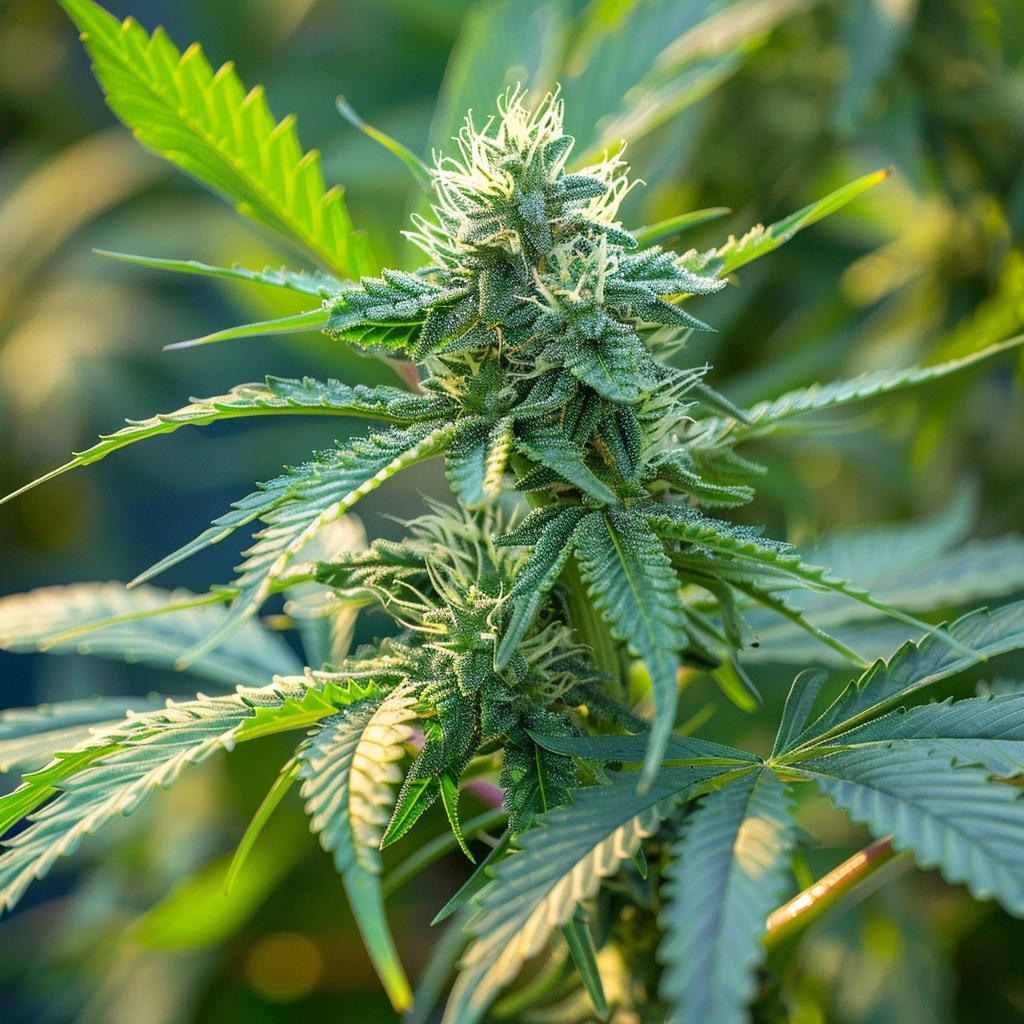In the intricate dance of modern medicine, where each step forward in treatment can sometimes mean two steps back in side effects, medical cannabis emerges not just as a participant, but as a lead dancer. It offers a natural, effective remedy for some of the most common yet debilitating side effects of numerous conditions and treatments: nausea and appetite loss. This detailed exploration delves into how cannabis is revolutionizing the approach to these symptoms, particularly within oncology, HIV/AIDS treatment, and other chronic conditions.


Table of Contents
ToggleA Natural Solution to an Age-Old Problem
Nausea and appetite loss are not merely discomforts; they are profound symptoms that can impede recovery and diminish the quality of life, turning meals into challenges and the simple act of eating into a feat of endurance. In the realm of medical cannabis, however, lies a potent ally that has shown remarkable efficacy in not only quelling nausea but also in kindling the flames of appetite.
The Dual Power of THC and CBD
At the forefront of cannabis’s therapeutic arsenal are two well-known cannabinoids: THC (tetrahydrocannabinol) and CBD (cannabidiol). THC, often spotlighted for its psychoactive properties, also possesses powerful antiemetic and appetite-stimulating effects. It interacts with cannabinoid receptors in the brain’s endocannabinoid system to regulate nausea and vomiting and to promote hunger. CBD, while non-intoxicating, complements THC’s effects by enhancing mood and alleviating anxiety, often associated with chronic illnesses and cancer therapies.
Scientific Backing and Clinical Endorsement
The effectiveness of cannabis in managing nausea and stimulating appetite is backed by substantial clinical research. Studies have consistently shown that cannabis can significantly reduce nausea induced by chemotherapy and can be a powerful force in combating anorexia and cachexia in HIV/AIDS and cancer patients. This has led to the FDA approval of cannabinoids like dronabinol and nabilone for these specific purposes.


Integrating Cannabis into Medical Protocols
Incorporating cannabis into medical treatment protocols offers a holistic approach to managing symptoms that are often poorly controlled by conventional medications. This integration, however, requires an understanding of dosage, timing, and the delivery methods that best suit individual patient needs.
Personalized Cannabis Care
Choosing the right strain and formulation is crucial for maximizing the therapeutic benefits of cannabis while minimizing potential side effects. Indica strains, for example, are often recommended for their ability to reduce nausea and stimulate appetite. The choice between different forms of cannabis—such as oils, tinctures, or edibles—depends on patient preference, the immediacy of the needed effect, and the duration of relief required.
Timing and Dosage: Key to Efficacy
For chemotherapy patients, timing the intake of cannabis can be critical. Administering cannabis an hour or so before a chemotherapy session can help preemptively control nausea that often follows treatment. Regular, smaller doses can help maintain appetite and reduce nausea over time, rather than occasional large doses that might lead to increased tolerance or undesirable side effects.


Challenges and Considerations
Despite its benefits, the use of cannabis in treating nausea and appetite loss is not without its challenges. Legal barriers, the stigma around cannabis use, and the need for more targeted research are significant hurdles. Moreover, understanding and managing the psychoactive effects of THC are crucial for ensuring that it is a viable treatment option for a broad spectrum of patients.
Overcoming Legal and Social Hurdles
The legal status of cannabis varies by jurisdiction, affecting access for many patients who might benefit from its use. Additionally, societal perceptions of cannabis use can influence patient willingness to try this therapeutic option. Education and advocacy play critical roles in changing laws and attitudes towards cannabis in a medical context.
Future Directions: Research and Development
Continuing research into the pharmacokinetics and pharmacodynamics of cannabinoids will enhance our understanding of how these substances interact with the body to affect nausea and appetite. Advances in genetic profiling might someday allow for personalized cannabinoid therapies, optimizing the efficacy and safety of cannabis-based treatments.
Conclusion: A Compassionate Approach to Care
The use of medical cannabis in treating nausea and appetite loss represents more than just a medical advancement; it embodies a shift towards more compassionate, patient-centered care. By providing an effective, natural solution for these debilitating symptoms, medical cannabis not only enhances the quality of life but also respects the patient’s right to choose their path to recovery. As research expands and societal acceptance grows, cannabis will continue to play a critical role in shaping the future of symptom management in modern medicine.
FAQ: Medical Uses of Cannabis for Nausea and Appetite Stimulation
How does medical cannabis help manage nausea?
Medical cannabis, particularly the cannabinoid THC, has been shown to effectively reduce nausea by interacting with the cannabinoid receptors in the brain, which are part of the endocannabinoid system. This system regulates several bodily functions, including nausea and vomiting control mechanisms.
Can cannabis improve appetite?
Yes, one of the well-documented effects of THC, a primary compound in cannabis, is its ability to stimulate appetite. It does this by binding to cannabinoid receptors in the brain that control hunger signals, often referred to as giving users “the munchies.” This effect is particularly beneficial for patients suffering from conditions like cancer or HIV/AIDS, where appetite loss is a common symptom.
Is medical cannabis safe for treating nausea and appetite issues?
Medical cannabis is generally considered safe for treating nausea and appetite issues, especially when compared to the potential side effects of conventional treatments such as chemotherapy. However, as with any treatment, it comes with potential side effects, such as dizziness, dry mouth, or psychoactive effects, which need to be managed under the guidance of a healthcare provider.
What forms of cannabis are best for nausea and appetite stimulation?
The form of cannabis can depend on the patient’s preferences and specific medical needs. Inhaled cannabis (via smoking or vaporizing) tends to work quickly for immediate relief of nausea. Edibles and oils may be more suitable for long-lasting appetite stimulation and sustained relief from nausea but come with a delayed onset of effects.
How do I know the correct dosage of cannabis to use for nausea and appetite stimulation?
Determining the correct dosage of cannabis is critical and can vary widely between individuals. It is generally recommended to start with a low dose and gradually increase as needed, based on the patient’s response. Consulting with a healthcare professional experienced in medical cannabis is essential to establish a safe and effective dosing regimen.
Can anyone with nausea or appetite issues use medical cannabis?
Not everyone may be suitable for medical cannabis treatment. Patients with a history of mental health issues, particularly psychosis, should use THC with caution as it can exacerbate such conditions. It’s important for patients to undergo a comprehensive medical evaluation to determine if medical cannabis is an appropriate treatment option for their specific condition.
What are the legal considerations for using medical cannabis for these conditions?
The legality of medical cannabis varies by location. In regions where it is legal, patients typically need a prescription or a medical cannabis card to purchase and use cannabis legally. It’s important to consult local regulations and obtain medical cannabis through legitimate, authorized dispensaries.
Are there long-term effects of using cannabis for nausea and appetite stimulation?
Long-term effects of cannabis use can include changes in brain function, particularly with heavy use starting at a young age, and potential dependency. However, for many patients dealing with severe symptoms of life-threatening illnesses, the benefits of cannabis may outweigh the risks. Regular monitoring by a healthcare provider is recommended to manage any potential long-term effects.
These FAQs are designed to provide a concise overview and helpful insights into the use of medical cannabis for managing nausea and appetite issues, underscoring the importance of professional guidance and careful consideration of individual health circumstances.
Kannabu's Online Cannabis Educational Resources
Read Educational Online Guides and Articles to Learn About Cannabis
- Navigating the Green Path: CBD vs. THC in Medical Treatment
- The Aromatic Architects of Healing: The Role of Terpenes in Medical Cannabis
- Navigating the Green Frontier: Clinical Trials on Cannabis and Its Effects
- Charting the Green Path: Cannabis Dosing Guidelines for Medical Use
- The Endocannabinoid System: Nature’s Balancing Act in Human Health
- A Green Horizon: Cannabis as an Alternative to Opioids
- Navigating the Mind’s Garden: Cannabis and Mental Health Treatment
- Unlocking the Green Code: Exploring the Genetic Diversity and Pharmacological Promise of Cannabis
- Weaving Green into Gold: The Integration of Medical Cannabis into Traditional Medicine
- The Therapeutic Promise of Medical Cannabis: Exploring the Spectrum of Cannabinoids
- From Young to Old: The Compassionate Embrace of Medical Cannabis in Pediatric and Geriatric Care
- Green vs. Traditional: Navigating the Crossroads of Medical Cannabis and Conventional Therapies
- Beyond the Pain: The Comparative Effectiveness of Cannabis in Chronic Pain Management
- Unlocking Cannabis’s Secrets: The Journey Through Cannabinoid Pharmacokinetics and Pharmacodynamics
- Green Paws: Navigating the Frontier of Medical Cannabis in Veterinary Care
- Unlocking Relief: The Transformative Role of Medical Cannabis in Pain Management
- Harnessing Harmony: Medical Cannabis and the Battle Against Autoimmune Disorders
- Embracing the Night: How Medical Cannabis Transforms Sleep Management
- Turning the Tide: Cannabis as a Catalyst for Relief and Recovery in Nausea and Appetite Stimulation
- Illuminating the Neural Pathways: The Transformative Role of Medical Cannabis in Neurological Conditions
- Harnessing Harmony: Medical Cannabis and the Battle Against Autoimmune Disorders
- A Clearer View: Medical Cannabis in the Treatment of Glaucoma
- Breaking Boundaries: Cannabis and the New Frontier in Epilepsy and Seizure Control
- Revolutionizing Relief: Medical Cannabis in Cancer Symptom Management
- Navigating the Storm: Cannabis as a Beacon of Hope in Multiple Sclerosis Treatment
- Cannabis: A Natural Respite for Arthritis and Joint Pain
- Healing from Within: The Role of Medical Cannabis in Treating Gastrointestinal Disorders
- Healing Invisible Wounds: Cannabis in PTSD and Trauma Treatment
- Balancing the Mind: The Potential of Medical Cannabis in Bipolar Disorder and Mood Stabilization
- Illuminating the Mind: Cannabis in the Treatment of Alzheimer’s and Neurodegenerative Diseases

